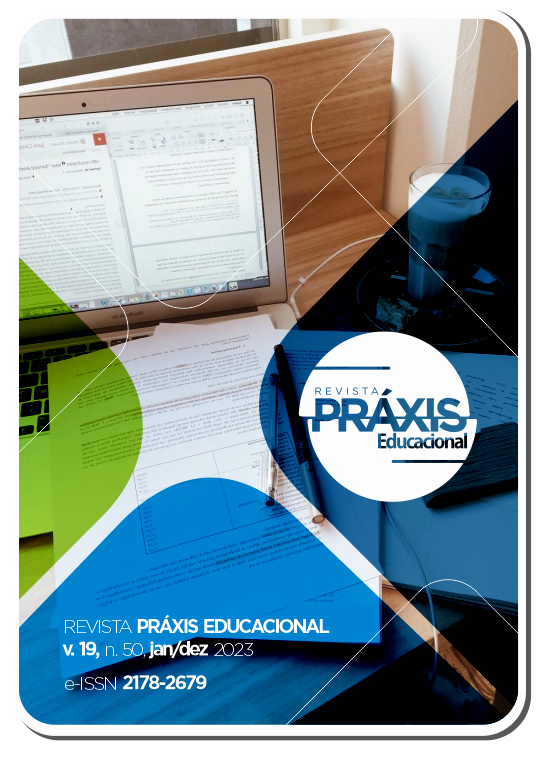Teaching intervention: towards contextualized and reflective teaching
DOI:
https://doi.org/10.22481/praxisedu.v19i50.14121Keywords:
literacy, contextualized and reflective teaching, teaching intervention, constructivist psychogenetic perspectiveAbstract
The article presents a reflection on teaching interventions anchored in the constructivist psychogenetic perspective and reiterates the proposition of contextualized and reflective teaching. Initially, it takes up the criticisms of literacy methods based on an understanding of the intense intellectual activity of children, young people and adults throughout the process of appropriating writing. It then highlights the importance of the contributions of didactic research, based on the psychogenetic framework, to understanding that didactic situations for teaching reading and writing should be planned taking as their starting point their primary function of enabling children to put into play their own ways of producing knowledge. Based on the analysis of a didactic situation in which children were challenged to write for themselves, she reiterates the case for contextualized and reflective teaching, in which teacher interventions are committed to problematization and not to explicit and directive teaching of the grapheme-phoneme relationship. For this reason, she concludes that teaching interventions should not be based on avoiding or correcting errors, but on taking on the commitment to problematize what children think and offer the didactic conditions necessary for them to continue learning about the uses and functioning of writing.
Downloads
Metrics
References
CASTEDO, Mirta; DÁVALOS, Amira; MÖLLER, María Angélica; SOTO, Arizbeth. Enseñar a leer y escribir en contextos diversos. Aportes para la formación docente. Córdoba: Dirección General de Educación Superior/Desarrollo Profesional Docente, 2022. Disponível em: https://dges-cba.edu.ar/wp/wp-content/uploads/2022/09/Enseniar_a_leer_y_escribir_Apuntes_para_la_FD_DGES_2022.pdf Acesso em: 10 nov. 2023.
CASTEDO, Mirta. Alfabetización inicial: teorías, investigaciones y prácticas de enseñanza. Un campo de complejas interrelaciones. In: C. Bazerman et al. (org.). Conocer la escritura: investigación más allá de las fronteras. Bogotá: Editorial Pontificia Universidad Jveriana, 2019. p. 47-70. Disponível em: http://www.memoria.fahce.unlp.edu.ar/libros/pm.1071/pm.1071.pdf Acesso em: 10 nov. 2023.
FERREIRO, Emilia. Escrita e Oralidade: unidades, níveis de análise e consciência metalinguística. In: FERREIRO, Emilia (org.). Relações de (in)dependência entre oralidade e escrita. Tradução Ernani Rosa. Porto Alegre: Artmed, 2003.
FERREIRO, Emilia. Desenvolvimento da alfabetização: psicogênese. In: GOODMAN, Yetta (org.) Como as crianças constroem a leitura e a escrita: perspectivas piagetianas. Trad. Bruno Charles Magne. Porto Alegre: Artes Médicas, 1995. p. 22 - 35.
FERREIRO, Emilia. Com todas as letras. Tradução Maria Zilda da Cunha Lopes. São Paulo: Cortez Editora, 1992.
FERREIRO, Emilia. Reflexões sobre a Alfabetização. Tradução Horacio Gonzales et al. São Paulo: Cortez/Editores Associados, 1981.
KAUFMAN, Ana Maria; CASTEDO, Mirta; TERUGGI, Lilia; MOLINARI, Claudia. Alfabetização de crianças: construção e intercâmbio – experiências pedagógicas na educação infantil e no ensino fundamental. Tradução Carolina Burnier. 7. ed. Porto Alegre: Artes Médicas, 1998.
KAUFMAN, Ana Maria; GALLO, Adriana A. Lectura y escritura: 31 preguntas y respuestas. Cidade Autônoma de Buenos Aires: El Ateneo, 2023.
LERNER, Délia. Ler e escrever na escola: o real, o possível e o necessário. Tradução Ernani Rosa. Porto Alegre: Artmed, 2002.
LERNER, Délia. Articular las situaciones didácticas fundamentales: ¿cómo y para qué? In: Seminário Internacional de Alfabetização. Canal no YouTube: Instituto Vera Cruz, 7 de outubro de 2023. Disponível em: https://www.youtube.com/watch?v=bYxg894Da0E Acesso em: 10 nov. 2023
WEISZ, Telma. O diálogo entre o ensino e a aprendizagem. 2 ed. São Paulo: Ática, 2009.
Downloads
Published
How to Cite
Issue
Section
License
Copyright (c) 2023 Práxis Educacional

This work is licensed under a Creative Commons Attribution-ShareAlike 4.0 International License.
You are free to:
Share - copy and redistribute the material in any medium or format; Adapt - remix, transform, and build from the material for any purpose, even commercially. This license is acceptable for Free Cultural Works. The licensor cannot revoke these freedoms as long as you follow the terms of the license.
Under the following terms:
Attribution - You must appropriately give credit, provide a link to the license, and indicate if any changes have been made. You may do so in any reasonable way, but not in a way that suggests that you or your use is endorsed by the licensor.
There are no additional restrictions - You cannot apply legal terms or technological measures that legally restrict others to make any use permitted by the license.










